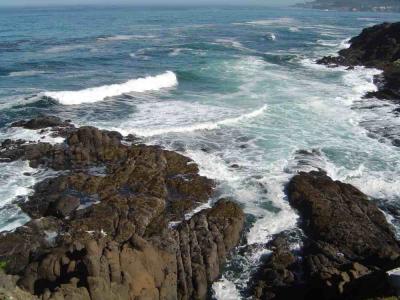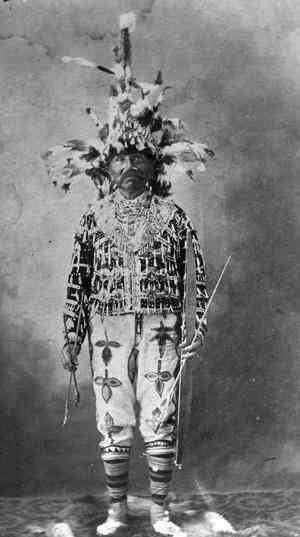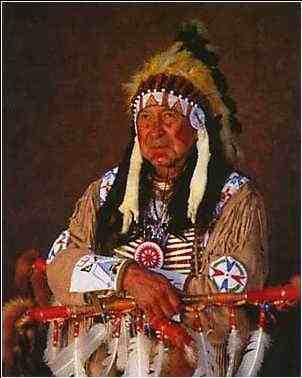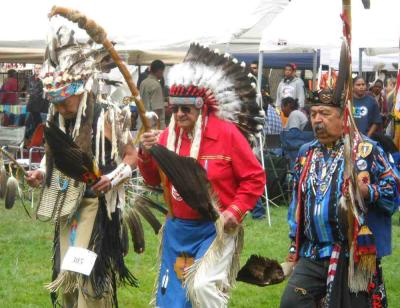
Before the arrival of early homesteaders, coastal Indian tribes speaking nearly 20 different languages including Chinook, Salishan, Suislaw, and Alsea lived in the general area. The natural harbor in Depoe Bay was used for seal hunting and fishing. There were many streams in the area, which provided an abundance of fish. The rugged coastline in area of current-day Depoe Bay had beautiful features such as Arch Rock, the spouting horns, sea cliffs and terraces, many caves, and a subterranean fresh water lake, but was lacking in easy access to sandy beaches.
In 1855, the U.S. Army established a supply station in a slough off the Yaquina River, about one mile from the present junction of Highway 229 and Highway 20, near Toledo.
In 1856, the Coast Reservation was formed, and Indians from many miles around were removed from their homes to the new reservation. Supplies for the Siletz Indian Agency, which oversaw the reservation, were brought there by ocean-going vessels and then carried overland. Today, this waterway is called Depot Slough.
In 1878, a man named Dr. F.W. Vincent and his grandfather sailed up the coastline from Newport, and observed a break in what looked like a wall of rock. They sailed closer in their 40-foot boat, and entered what they described as a beautiful little harbor (the present day Depoe Bay harbor), where they found anchor chains from a boat, two headlights, and the letters “U.S.”. They called the little harbor “Wrecker’s Cove.”

Depot Charlie – The Town’s Namesake
One of those who were forcibly removed to the Coast Reservation from his ancestral home in the Rogue (Tutuni) River Valley, was a young Tutuni/Joshua Indian named Charles. Minutes from the Council held at the Siletz Agency on December 15, 1873, with Chiefs of the Confederated Tribes reflect the following statement by “Depot Charlie”:
Depot Charlie (A Joshua, one of the most influential Indians on the reservation)
"Have heard many things I am not going to tell. You told us not to speak about anything except great things. I am sorry for one thing: I am sorry to have you leave to day in this storm; I would like you to stay here to-day; will tell you one thing, and I want you to put this in your heart. You have a good heart; so have I. I think now we are beginning to do better. Church-members have come here and taught us and now we are all trying to be good. Do you think it would be well for these bad white men to come and drive off good men both white and Indian? That is all I want to say. One thing more; we want a saw and flour mill. You see this old building; we would like a saw-mill to build a good church. I want you to put what I say in your heart; We want a flour mill, then we can raise our own wheat and make our own flour and sell it and get money. Now we have no wagons; we want wagons. I am not chief, but I will talk to you. I want these old people to have wagons. I don’t want to see old women pack wood on their backs. Government has but few wagons and the Indians but few. One thing more: do you intend the good that are coming to be given to us, or to be sold us? (The speaker said he was satisfied with either way.) I want to talk about great things. I want all my people to hold up their hands. (A number here held up their hands.) All these people belong to the church and believe in God; God sees you. I am talking to my brother; that is what I call you; I think I have talked straight to you."
As the years passed, Charlie became a leader in his community and eventually was called Chief. Former Lincoln County Historical Society archivist Jodi Weeber said his title was earned rather than inherited.
The July 12, 1918 edition of the Lincoln County Leader reported:
"Charlie DePoe, a leading man among the Indians, was a chief of the Joshua tribe and was noted for his good sense and wise councils and hospitality among the Indians. No one ever went away hungry from the home of DePoe Charlie."

The DePoe Family
According to the rolls of the 1885 census, Charlie (Charley) and his wife Minerva (Minnie) were aged 50 and 48 respectively, and they had five children: William (Willie), Delia, Robert (Bobbie), Clara (Mary), and Matilda (Tillie). Nine years later in 1894, when the U.S. Government took back much of the Coast Reservation land, members of the Siletz tribes were given 80-acre land allotments throughout the area. Charlie and Minerva each received 40 acres to the north of present-day Depoe Bay, according to the original allotment maps on file at the Historical Society.
Altogether, over 200 acres of undeveloped land that lay beside “a small ocean bay” was given to Charlie and his heirs. An official plat circa 1915 documents that Charlie, his wife Minnie, and children Matilda and William owned all of the ocean front land beside the bay. The land extended from the northern side of what is today Boiler Bay to the area now known as South Point. Charlie and Minnie resided on the land until their deaths.

Charlie and Minerva’s daughter Matilda was awarded acreage that is now within Depoe Bay city limits, from the small peninsula south to the middle of the harbor; her brother William was awarded the acreage from the bay to present-day Southpoint Street.
Charlie’s great-grandson, Chief William Hauser DePoe Sr., was born on December 14, 1929, to Robert Charles and Mary Houser DePoe. He was the fourth of five children: Reggie, Chuck, Peter, then William, and Roberta. He was a World War II veteran, a National Indian Basketball All Star, and a professional musician who played with Lionel Hampton and Tommy Dorsey. He spent his last 15 years in Depoe Bay, where he appeared in regalia at community events and devoted much of his time to Native American cultural development.
Chief W. H. DePoe Sr. died in 1997, and his son, Chief William “Chewescla” DePoe, holds his now-hereditary title. He is the second oldest of five children: Charlotte, then William, Ronald, Ilene, and Peter. Chief Chewescla has participated in athletics all his life, and still actively participates in many events, including basketball tournaments, jogging, the tribe’s annual “Run to the Rogue”, and dancing at the annual Gathering of Nations Pow-wow in New Mexico. He also attends the annual Fleet of Flowers held in Depoe Bay on Memorial Day.
Birth of the Town
Around that time, many Siletz Indians sold their land for low prices to land developers, and others forfeited their property because they hadn’t paid property taxes. Titles at the Historical Society show that the land owned by Matilda and William DePoe was sold after their deaths, by their siblings Delia, Robert, and Clara, in 1923 to a Siletz Indian couple, Frank and Rachel Carson, who eventually sold the property to a real estate speculator named Lee Williams for $6,000. In late 1926 or early 1927, Williams sold it to the Sunset Investment Company for $10,000. Officers of the Sunset Investment Company included President R.C. Yeast, E.B. Winchell, H.L. Collins, and H.T. Kent. Sunset divided the land around the bay into 185 lots which sold for $100 each.
In the late 1920s when the Sunset Investment Company purchased the DePoes' land with the intent of establishing a town here, a rosy future was predicted for the new town. It was believed to be destined that the town would become one of the leading summer and winter resorts on the Pacific coast.
